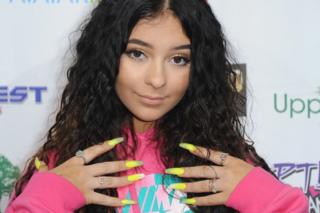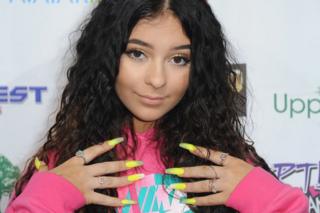Danielle Cohn: Are teen influencers being exploited?
Danielle Cohn posts provocative images and videos. She says she is 15, but her father claims she is younger. …

 Image copyright Getty Images
Image copyright Getty Images US social media star Danielle Cohn has nearly four million followers on Instagram and 1.4 million on YouTube. She’s also one of TikTok’s biggest stars, with more than 13 million fans.
The teenager’s photographs and their captions are often provocative.
She wears bikinis, lingerie and figure-hugging dresses, and her photo locations include bedrooms, pool-sides, and in one case lying beside a waxwork figure of the late Playboy founder Hugh Hefner, while wearing bunny ears.
Her recent brand collaborations include a women’s fashion label and an energy drink.
“What would u ask me if u knew my answer would be yes?” she wrote recently beside a picture of herself wearing a tight white dress, her hands above her head, in which she promoted a fashion brand.
She is managed by her mother.
But this a good line of work for a teenager?
“Once on the internet, always on the internet,” says Rohan Midha, co-founder of the influencer agency PMYB.
“When she does hit 18 she may not be able to be doing these brand deals any more. It may not be a sustainable career.
“She may need to get a normal job, like everyone else… all of this stuff will come up when an employer searches her name.”
Mr Midha said he didn’t think young teenagers were capable of making such a huge decision about creating a specific identity that would follow them into adult life.
“I believe that often it’s an older relative or family member who has realised there is the opportunity to make some money in the short term and puts together a social strategy to grab the attention of the media,” he said.
Under UK law the employment of children below the age of 18 is heavily regulated but social media companies have no such obligations because they are not employing the children who use their platform, explains Keely Rushmore, partner at British law firm SA Law.
How about the brands they collaborate with?
“In the UK children can potentially enter into contracts for services personally, but this can be problematic,” she said.
“A way around this is to contract with the parents of the child instead, and I would expect that many brands choose this option in order to protect themselves.”
And there’s another issue – there’s a continuing debate about how old Danielle actually is.
Last week her estranged father, Dustin Cohn, wrote a long Facebook post in which he said he was unhappy with her online activities and claimed that Danielle was just 13 years old.
He has previously released a document which he says is her birth certificate.
His intervention made headlines across the world, including in the UK’s Sun newspaper, the New Zealand Herald, and Canada’s Toronto Sun.
Danielle issued an angry response to her father’s claims, saying she was “living her best life”.
However, she did not mention her age.
According to Danielle’s bio, and previous assertions by Danielle herself, she is 15. The BBC has tried to contact her mother for comment.
Whatever her true age, some of the suggestive images date back more than two years on Danielle’s Instagram account.
She’s also no stranger to controversy after a video which appeared to show her getting married and revealing a pregnancy were released this summer – this turned out to be a promotion for a music video.
Her mother argues that what her daughter is doing is for her own benefit.
She said previously: “You might not agree with what my daughter [posts] or what she does, but at this age she [is] setting up her life… she [can] become a millionaire at her age.”
While Danielle Cohn appears to have a good relationship with her mother, who features in many of her YouTube videos, the comments left under them suggest not all viewers are entirely comfortable with Danielle’s work.
“You’re 13, stop it. Have a childhood while you can,” wrote one below a video uploaded on Sunday.
Children’s charity the NSPCC warns that even in the short term, there is no way of controlling what happens to an image once it is on the net.
“Parents should be aware there can be negative consequences of children sharing pictures of themselves on social media, as they will never be able to control where those images go,” said a spokeswoman.




